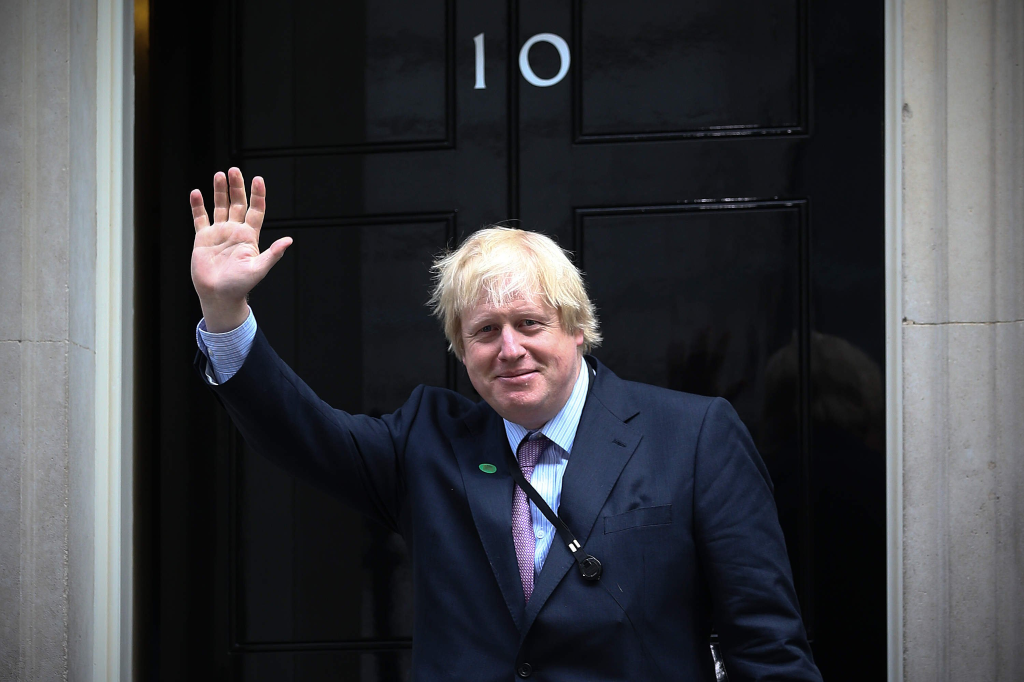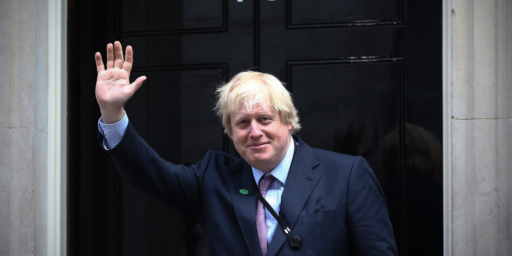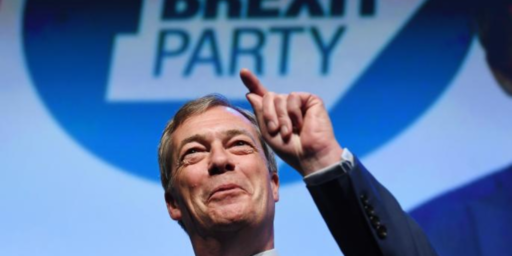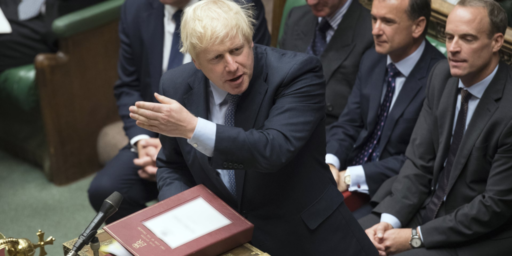Boris Johnson Headed For A Snap Election?
It looks as if Boris Johnson's government could be looking to call for a snap election to he held in the immediate aftermath of Brexit.

Boris Johnson has been British Prime Minister for just over two weeks and the signs are growing that he’s already poised to roll the political dice and call a snap election:
Boris Johnson’s chief of staff cancelled all leave for government advisers until 31 October in a missive on Thursday night, raising further speculation the government is planning for a forced snap election in the aftermath of the UK leaving the EU with no deal.
Special advisers were emailed by Johnson’s senior adviser Edward Lister on Thursday night, saying there was “some confusion about taking holiday”. They were told none should be booked until 31 October, with compensation considered “on a case by case basis” for those who had already booked leave, though the email said advisers were free to spend their weekends “as you wish”.
“There is serious work to be done between now and October 31st and we should be focused on the job,” the email said. The directive angered many recipients, who say staff are exhausted and are facing an unprecedented workload in September and October.
One recipient described the email as “posturing” and said special advisers, known as “spads”, are being used as part of the PR war to convince the public the government is serious about no deal.
Johnson himself also wrote to all members of the civil service telling them the government’s main focus was now to prepare for a no-deal Brexit. In the letter, Johnson said he wanted to underline that the UK would be leaving on 31 October “whatever the circumstances” and that the civil service must prepare “urgently and rapidly” as its top priority.
“I know many of you have already done a great deal of hard work in mobilising to prepare for a no deal scenario, so that we can leave on 31 October come what may,” the letter said.
“Between now and then we must engage and communicate clearly with the British people about what our plans for taking back control mean, what people and businesses need to do, and the support we will provide.”
Downing Street refused to deny on Thursday that a snap election would need to take place in the first few days of November if MPs forced a vote of no confidence in Johnson in early September, but said the prime minister would ensure the UK had left the EU on 31 October.
It remains unclear if anti-Brexit MPs in parliament would be able to swerve a general election, as senior Labour and Liberal Democrat figures clashed on Friday over their parties’ apparent willingness to place conditions on any unity government or coalition prepared to stop a no-deal Brexit.
The shadow chancellor, John McDonnell, has said Labour would attempt to form a government in the 14 days following a confidence vote, to try to avoid a snap election, but ruled out Labour backing for any unity government candidate, such as a Tory veteran like Ken Clarke or Dominic Grieve.
Labour has said any MP wishing to stop no deal should give their backing to Jeremy Corbyn’s attempt to form a government. However, on Friday the Lib Dem Chuka Umunna, a former Labour MP, claimed a “substantial minority” of his former colleagues would not support Corbyn being prime minister.
“The problem there is with the prospect of Jeremy Corbyn taking up the role of leading an emergency government is he cannot command a majority among his own MPs, never mind others like Conservative rebels who would refuse to give him confidence,” he told BBC Radio 4’s Today programme.
“I know, because I have spoken to them. There is a substantial minority of Labour MPs at the very least who simply would not countenance Jeremy Corbyn being the prime minister of this country. So the question is, is there a figure who, as an alternative, could command a majority?”
McDonnell tweeted after Umunna’s comments that the Lib Dems appeared willing to risk no deal rather than back Labour.
This report from The Guardian is referring to the possibility of a snap election in the immediate aftermath of a Brexit, whether that happens under the terms of what at this point seems to be an elusive deal that a majority in Parliament will approve or in the form of a no-deal “hard” Brexit. That would mean that he’d likely call the election sometime in late September or early October and that the election would occur in mid-November at some point before the holiday season. The obvious gamble here would be that Johnson and the Conservatives would be able to benefit sufficiently from what they anticipate to be a post-Brexit euphoria with the Tories running on a message that says they delivered on the promise to see Brexit through to the end. If it works, then Johnson would perhaps be able to increase the Conservative majority in the House of Commons to the point where it would not be necessary to enter into the current agreement with Northern Ireland’s Democratic Unionist Party that is currently keeping them in power. The other possibility, of course, is that the Tories could lose even further ground in Parliament to the point where they can’t form a government.
There also seems to be a possibility that Labour and the Liberal Democrats, along with anti-Brexit Conservatives, could try to force a no-confidence vote in the current government that would either force an election before the October 31st Brexit date or lead to the creation of some kind of unity government. The biggest hang-up in that effort though appears to be objections to the idea of Labour Party leader Jeremy Corbyn becoming Prime Minister, something that even some Labour MPs are opposed to. the idea of a Prime Minister Corbyn. If the potential plotters can’t get beyond that hang-up then they are unlikely to be able to push Johnson out prior to the end of October. Furthermore, even if they did succeed, it’s hard to see what they could do to stop the Brexit process at this point. The deadline is in place and unlikely to move again. Brexit will happen. The only question is whether it will be of the “hard” or “soft” variety. What happens after that is anyone’s guess.





I predict this post will get bigfooted by the Epstein news in 3… 2…. 1…
@OzarkHillbilly: Indeed.
I found this indicative:
If the reporting is accurate, Boris doesn’t give a rat’s ass about winning or losing an election. In fact he appears to think that an election is the only thing that can stop a no deal Brexit and he intends to see it through before hand even if it costs the Tories their majority. He’s on a suicide mission, he’s going to go kamikaze and crash the UK out of the Euro zone and into he doesn’t care what, recession, depression, immolation, annihilation…. Eggs/omelettes, right?
All of which makes me wonder who has promised him what to see it thru.
Early November strikes me as the moment of peak panic. Even those in favor of leaving will probably have moments of doubt when the papers are filled with stories, big and small, about the initial crashing out. And business, which wants to stay, should be able to fan the flames.
There’s a third reason Johnson might want to call a snap election after Brexit: he might want someone else to handle the chaos. It’s like the republicans here destroying the economy so a Democratic president has to try to do something about it.
If you’ve followed EUreferendum, the theory is that Johnson is trying to have the U.K. crash out on October 31st so as to clip the wings of the Brexit Party (and UKIP, if any of them are still around), then hold a General Election while everyone is shellshocked over leaving and before any of the effects of Brexit in fact hit. That will give Johnson another 5 years in office before he has to hold another election.
An election is inevitable; since the Brecon by-election Johnson has a (nominal) majority of one.
And that’s dependent on the DUP.
The question is, election pre-Brexit or post-Brexit?
The route to victory for a Johnsonian Conservative Party has to be to kill off the Brexit Party, which means either:
– post exit strategy: No Deal Brexit, shoot their fox, annihilate the threat at post-exit election, and bludgeon through an opposition divided between Corbynite Labour, LibDems etc.
– pre-exit strategy: pact with Farage, engineer a Commons crisis, go to the country on a “People vs Parliament” basis, hope for a big enough majority to coerce the ERG and betray both the DUP and BP, get an adjustment to May’s Withdrawal Agreement (switch back to an “Northern Ireland only” backstop, some blather in the political declaration)
i.e. slap lipstick on the pig, and force the ERG to kiss it.
OTO all No Dealers need do is cling on till November 1st when No Deal exit is the default.
At present the Brexit Party polling combined with a major Lib Dem resurgence looks enough to deny Conservatives a majority.
At the same Corbyn’s massive unpopularity leaves the Labour Party pitifully short of where they should be to win.
We live in interesting times.
@grumpy realist:
Yes. That what the silly sods think.
The thing is, the Leaver leadership are dominated by ToryBoys who are accustomed to affecting an insouciant air and waving at underlings:
“Little people, make it work! Little people, sort it out! ”
They are simply unable to process the fact that the world will not, in fact, rearrange itself to suit their convenience.
Let alone to grasp the sheer complexity of the economic systems they are bent on disrupting.
It’s almost amusing.
People who have spend half a lifetime chuntering on about the intricate evolutionary marvels of capitalist market systems expect to hit them with a sledgehammer without consequence.
In reality a No Deal Brexit is likely to make the gap between exit and impact far to short to exploit.
In my more pessimistic (or grimly ironic) moments I suspect that in that event, winning or losing an election may be the least of their worries.
Their concerns may rather be mobs, pitchforks, torches, tar, feathers, spikes on gates, and can you spell “Act of Attainder”?
Is this not death for the Tories?
I feel I’m missing something. I know Corbyn has utterly mishandled this, but doesn’t this doom the Tories at the expense of the British economy?
I’m totally missing some nuance, because a no deal Brexit kills the Tories for decades electorally (correct?). I do not get this. It’s bonkers; and we elected Trump, so I know from bomkers.
I’m positive that Brits do not grok the subtle things about US politics. This is one of those things that I don’t fully understand about yours.
@de stijl:
I think it will kill the Tories; and few parties will have done more to deserve such a fate..
If the Labour can’t find a way past Corbynism it may doom them as well; and the Union and the interests of the people with them.
My explanation of the psychology of this is partly as I said in my reply to grumpy realist.
A lot of the Conservative leadership come from backgrounds, upbringings and educations which have ingrained a sense of privilege, while tending to relegate analytical thinking and technical details to subordinates.
They have a good deal of trouble in grasping that some aspects of the world, whether the physical and economic intricacies of modern business logistics, or of trans-national law and market regulation, cannot be made to accord to their will, either by ordering them to comply, or by a cosy arrangement among the rulers.
And they are even more unable to grasp that a course with bad outcomes for others could entail a bad outcome for them.
Even those from a rather different background seem to adopt much of the mentality as if by social osmosis.
While a large number of the Party at large either have similar attitudes, defer to the leadership, or are convinced that any talk of bad outcomes is just their opponents attempting to thwart them.
In part, blame the English class system.
In other parts, blame the post-Thatcher psychological collapse of the Conservative Party in the face of modernity, the economic tribulation of the old industrial working class, and the capture of Labour by a coterie of tankies and trots.
Both the main political parties are being eaten alive by different forms of poisonous nostalgia breeding fantasies of a future-in-the-past.
Neither Right-Brexiters nor Corbyn accept how damaging a bad exit could be; that the opportunities will NOT outweigh the damage; and both persist in the stupidity of thinking that their political tactical manoeuvrings are of more importance than the economic fundamentals of the country.
@JohnSF:
Thank you for the insight. I appreciate that.
I could Google “tankies and trots”, but would love to hear your version. Contextually, it sounds like folks inordinately fond of an idealized past and have fixated on it.
Why is not Labour pushing for a new vote? I understand they cannot make it happen given the distribution of parliament, but why is that not foremost in their comments daily?
I do not get why Corbyn behaves as he does and speaks as he does. As an outsider, it looks like he wants it ( no-deal Brexit) to happen. I think this is the bit I’m missing. Why? How will benefit him and Labour?
I can understand reactionary Tories. We have their ilk here. Although, our reactionaries tend to be lower middle class rural whites. And we have a scenario in America now where if the left calls for something, anything the right immediately concludes that policy is dangerous, un-American, radical and preposterous. Without thinking it through. Even if it would be a good thing for everyone. Less so, but to a certain degree, the opposite is also true.
This may very well be my bias, but how do folks not get this will be a complete economic disaster? Quite likely to break the Union?
As an outsider, I’m baffled. Probably most by Corbyn’s / Labour’s muted response. Is a political party that beholden to it’s leader?
Thanks again for your helpful response.
(If you ever need an insider’s take on US politics, I will give an objective response.)
Be well.
I assume “trots” means Trotskyites. Correct?
Still trying to puzzle out “tankies.”
I may have to Google that one.
@de stijl: Urban Dictionary told me that it’s an allusion to “roll out the tanks” and as such refers to Stalinists.
Urban Dictionary confirms your assumption about Trotskyites.
@de stijl:
Sorry for the Brit political slang there.
So, yes, trots = trostskyites, in this context mainly former Militant Tendency sympathisers.
Tankies = Stalinists, originally, after the crushing of the Hungarian revolt; more generally those on the Left who saw the USSR as preferable to the West.
Corbyn’s team includes, at least, sympathisers of both strands,
@de stijl:
The attitude of Labour to a second referendum is due, I think to three factors:
1) a sizable number of the leadership circle are Eurosceptics themselves, especially Corbyn himself
2) they are fixated by the promise of winning/threat of losing Leaver votes in the Lab/Con marginals, and even a potential Leaver Conservative and/or Brexit Party threat to the old industrial Northern heartlands
3) for some reason they either overlook the polling that indicates that in most Labour contestable seats the majority of Labour and floating voters are Remain-inclined; or else have assumed those voters have nowhere else to go; they may be recalculating now given LibDem surge in the polls
4) Some of the more barking hard left are tempted by “revolutionary defeatism” aka “the worse, the better”: let the Conservatives crash out, come to power in the aftermath, use the economic chaos as a rationale for full bore socialist policies.
Corbynites might be unwise to test their luck too far, though.
The Conservatives are at present the obvious victims of internecine war, but a lot of MP’s viscerally distrust Corbyn and his allies, both re. principles and political ability.
Labour could easily follow the Conservatives into oblivion.
Seven Remainer Labour MP’s have already walked.
5) Putting my habitual cynicism to one side, there are also those who believe as a point of democratic principle, as well as from political calculation, that the referendum result should be honoured.
This could have been combined with an economically acceptable outcome and avoiding the Northern Ireland difficulties by pursuing participation in the Single Market similar to EEA/EFTA membership plus a (temporary?) customs area arrangement similar to Turkey; aka “Flexit”: flexible Brexit).
(This sort of approach was my initial preference.)
Unfortunately May’s “red lines” re. Free Movement of Labour etc ruled this out; and Corbyn’s team made the catastrophic error of trying to avoid being outflanked by May on anti-migrant appeal by also ruling out the Single Market.
Since then, unwilling to backtrack on this, Labour have been unable to campaign on a realistic EFTA/EEA/Flexit policy, and are left clinging to silly “unicornism”; proclaiming Labour will pursue a “jobs first Brexit”, and membership of a customs union; in effect they want the Single Market without free movement, just as May did, and similarly unacceptable to the EU.
@de stijl:
That’s the horror of the situation.
The overwhelming majority of Labour MP’s are Corbyn-sceptic, to put it mildly.
He lost a vote of confidence among them in 2016 by 172-40 (and that 40 probably includes at least ten who only voted for out of fear of their constituency parties). Deputy Leader Tom Watson has been active in mobilising Labour Remainer MP’s as well as pushing for a harder line on dealing with anti-Semitism.
But Corbyn has (or had) overwhelming support among the membership, especially the newer younger members who joined after David Miliband’s leadership, and the old leftists who rejoined to dance on the grave of New Labour.
Though Brexit is testing this: the membership is overwhelmingly Remainer, torn between that and activist support for Corbyn’s left policies, and residual hatred of New Labour MP’s, and there have been reports of numerous local party meetings complaining about Labour policy.
Certainly Corbyn’s former close ally, Shadow Chancellor John McDonnell, who is as much a hard leftist as Corbyn or McCluskey, but much smarter than either, has been arguing for a less passive approach.
Despite this, so long as the membership is willing to support Corbyn, the fear of deselection by their constituency parties will limit what Labour MP’s will do.